Posts Tagged ‘Night’
Sunday, June 11th, 2017
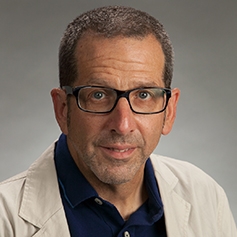
Alan Astro PhD, Trinity University
By Carolyn Yeager
I happened upon this video and recognized my own text of Yiddish-to-French-to-English translation being used by this professor at a Catholic university in San Antonio TX. Though a native of Brooklyn, Alan Astro says he has been at Trinity University for over 25 years. His field is modern languages and literatures; one of the subjects he teaches is Yiddish culture.
His lecture, titled “Christianity and the Holocaust in Elie Wiesel’s Night” was filmed by St. Francis College and at the 6min59sec mark, he shows text from my very important 2012 article “Night #1 and Night #2—What Changes were Made and Why, Part One.” So you never know who is reading this site – a lot of people and all people who have a professional interest in Elie Wiesel.
At 6:59, Astro shows text translated by Kladderadatsch for this web site, which he calls “Where’s the tatoo?” (sic). He says that even though Yiddish was not known very well even in the Jewish world … “Holocaust deniers somehow get their hands on the Yiddish and manage to get it translated. Here is one holocaust denier or minimizer on the web who makes a whole big deal about the fact that in the Yiddish and French and English original translations Wiesel “is not quite 15” when he is arrested and sent to Auschwitz, whereas he is 15 in the newest edition and this is considered to be something that somehow questions the veracity of the whole historical knowledge of the Holocaust. But that’s another issue all together. But it does show you that things can very often have strange consequences.” (He goes quickly to something else at 8:10. So Astro has my text on the screen for one minute, 11 seconds, enough time to read it all.
This is the segment he used:
3. Not yet fifteen … or fifteen?
UdV Page 63 : Yingl, vi alt bistu? fregt mir a heftling. Zeyn pnym iz geven in der fintster, ober zeyn kol iz geven a mids, a varems. Nokh nisht keyn 15 yor, hob ikh geentfert.
“Kid, how old are you?” a prisoner asked me. His face was in darkness, but his voice was tired and warm. “Not yet 15 years,” I answered.
LN Page 54: Hé, le gosse, quel âge as-tu? C’était un détenu qui m’interrogeait. Je ne voyais pas son visage, mais sa voix était lasse et chaude. “Pas encore quinze ans.” / Not yet 15 years.
SR Page 39: “Here, kid, how old are you?” It was one of the prisoners who asked me this. I could not see his face, but his voice was tense and weary. “I’m not quite fifteen yet.”
MW Page 30: “Hey, kid, how old are you?” The man interrogating me was an inmate. I could not see his face, but his voice was weary and warm. “Fifteen”
This very important passage was discussed above. I think the reader would agree that “not yet 15″ can mean even farther from the age of 15 than “not quite fifteen.” What is clear is that Marion Wiesel has changed the author’s original words to fit them to her husband’s age in Spring 1944.
Astro dismisses this important observation with the misrepresentation (in boldface above) that the example is intended to negate the entire holocaust story. No, it isn’t; obviously it questions the veracity of Elie Wiesel’s truthfulness in “Night” since this scene took place in April or May, and the real Wiesel’s 16th birthday was coming up on September 28, 1944. Thus Wiesel was not 14 in Spring ’44, but had already been 15 for at least 7 months. Astro is not interested in telling that to his audience or pursuing it himself. He is a professor of languages and literature, but not an expert on Elie Wiesel or the Holocaust. Far, far from it.
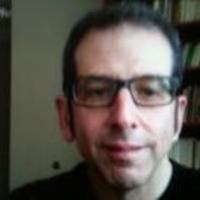
Another photo of Professor Alan Astro.
At 19:33, hear him pronounce Wiesel’s name as weasel (as I say it) and then quickly correct himself to the affectation Wie-zell that he used throughout the talk. This indicates that ‘weasel’ is his default way of pronouncing the name, or the way he first learned it.
At right is another photo of Professor Astro I found online that gives what might be a truer look at the man.
8 Comments
Category Featured | Tags: Tags: Elie Wiesel, Naomi Siedman, Night, Un di Velt Hot Gesvign,
Social Networks: Facebook, Twitter, Google Bookmarks, del.icio.us, StumbleUpon, Digg, Reddit, Posterous.
Friday, June 9th, 2017
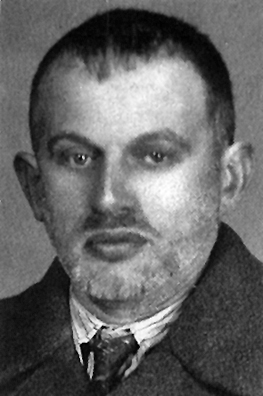
Shlomo Wiesel, Elie’s father, in 1942, a young looking man.
By Carolyn Yeager
Elie Wiesel wrote two ‘official’ accounts of his 1944-45 concentration camp experience: his novel Night (1958) and his official autobiography (Part One), All Rivers Run to the Sea (1995). Thirty-seven years separate these two publications.
Three articles written by me in 2011 (and here) and 2012 contain information that demonstrate conclusively that Night is not a true account of the experience Wiesel may have had with his family at Auschwitz-Birkenau in 1944. Night is written for “effect” and to be a gripping father-son drama that rises to the standards of a literary work of art. Night cannot, therefore, be called Wiesel’s testimony – a claim he made on several occasions.
Because a lot of information was conveyed in these three articles – a lot of details were covered, and I had other purposes in mind – this crucial fact easily gets lost to the reader’s attention. In this article I will zero in on this “crucial evidence” in order to make it crystal clear why Night can only be considered a work of fiction and Elie’s autobiography “All Rivers …” is the place to go for Elie’s ‘true’ account of his experience.
The main evidence I want to put up front is the agreed upon birth date of Elie’s grandmother Nisel Bash Wiesel, mother of Shlomo and Mendel and four daughters. In 1957, Yaakov Fishkovitz filled out a Yad Vashem Page of Testimony (PoT) for his aunt Nisel, stating she was born in 1881 in Chust, Romania and died at Auschwitz in 1944. In 1999, Eliezer Shlomovitz, living in Los Angeles CA at the time, also filled out a PoT for Yad Vashem giving his grandmother’s birth year as 1880, with a question mark. Elie Wiesel never filled out a form for his grandmother, whom he wrote he was very close to, nor for his mother or sister, but only one for his father.
Why Grandma Nisel’s birth date is so important
A birth date of 1880-81 makes Grandmother Nisel 63 or 64 years old in 1944, a figure agreed upon by Hilda Wiesel. However, the story line in Night, accepted as factual by writers, journalists and Internet sources like Wikipedia, gives Father’s age as 50 in 1944, which, if true, would mean grandmother Nisel was only 13 or 14 years old when she gave birth to Shlomo, her third child, and only 11 or 12 at most when she gave birth to her first child. Such a shockingly young age is not in the tradition of Hasidic Judaism to which the Wiesels’ belonged.
In the scene in Night when the family arrives at Birkenau around midnight, Father tells a fellow prisoner who questions him that he is 50 years old and the prisoner urges him to say he is younger. Similarly Eliezer says he is “not quite 15” and is told to make himself older. He subsequently answers “eighteen” when questioned by the guard (or Mengele?). Both men are passed on through. From this, and apparently this alone, the default birth date for Shlomo Wiesel became 1894 and no one, including Elie, ever questioned or corrected that. However, Elie slyly left blank the date of birth on the Yad Vashem PoT he filled out for his father in 2004, and he never offered a birth date for either of his parents.
Wiesel adds 10 years to Father-son age difference in Night
In 1957, Yaakov Fishkovitz also filled out a Yad Vashem PoT for his cousins Shlomo and Mendel Wiesel, giving their dates of birth as 1903 and 1905 respectively. These are probably correct because it makes their mother Nisel age 22 or 23 when Shlomo, her third child, was born, and age 24-5 when Mendel, her fifth, was born.
So why did Elie, in writing Night, make Father 50 years old instead of his real father’s age of 41? Answer: To make the theme of a role reversal between father and son more dramatic, of course. To deepen the loneliness felt by the boy watching his worn-out father break down under the cold, uncaring death machine perpetrated by the evil German Nazis. To write the most heart-breaking story he could!
For the same reason, his 10-year old sister became seven years old and he even made himself a year younger (14 going on 15 instead of 15 going on 16).
It couldn’t be more clear that his purpose in writing Night was different than his purpose for All Rivers, which attempts to give a record of his early life and actual family history. In fact, while Wiesel writes pretty extensively about his grandmother Nisel, who even accompanied the family to Auschwitz in All Rivers – she doesn’t appear at all in Night. He left her out as extraneous to his tightly-constructed narrative, the purpose of which was not to tell it as it really happened.
Summing up
So when the facts diverge between the two books, as they often do, go with All Rivers as the more accurate version. For example, in Night, Eliezer is in the hospital at Birkenau in January 1945 with an infected foot. In All Rivers, he tells the very same story but it is not his foot at all, but his knee that is operated on! If there is any truth to the story, which can be considered doubtful, accept that it was his knee. (I think Elie, or one of his Night editors, liked the dramatic image of leaving a trail of red blood in the snow, so what the heck, just change knee to foot!)
To sum up, Wiesel’s willingness to change important details about his family, and his own major experiences, tells us that creating a “true account” of their year of internment was not his goal. For him, no different from most survivors who write memoirs, he preferred what was “true in his mind.” Or, in other words, what made for a better and hopefully more successful book.
2 Comments
Category Featured | Tags: Tags: All Rivers Run to the Sea, Auschwitz-Birkenau, Buchenwald, Grandma Nisel Wiesel, Night, Shlomo Wiesel,
Social Networks: Facebook, Twitter, Google Bookmarks, del.icio.us, StumbleUpon, Digg, Reddit, Posterous.
Wednesday, June 8th, 2016
 BY CAROLYN YEAGER
BY CAROLYN YEAGER
Why is it that no one can mount a sustained argument against the contents of this website? Or even a single good argument. There have been a few who thought they had done so, but after my reply, they disappeared. All I get nowadays are really pathetic, 6th grade-level comments (I wish they really were in the 6th grade; then I might get somewhere with them) like this one from “Leelee” that came a couple of days ago. Rather than post it as a comment (to an article from 2011!), I decided to make an article out of it, as I did with Tiffany Yep. Now Tiffany is a genius compared to Leelee, as you will see. But I’m going to respond to what Leelee says anyway because it’s so typical of the kind of complaints that are sent to this site.
Leelee wrote:
You know what is even more disgusting? That you people think he is a fraud because he won’t show you his numbers. This guy went through something horrific and you won’t give him respect because he won’t show you something that dehumanizes him. Have you actually thought about the truths out weighing the lies? Instead you manipulate people with your little side comments that don’t even give Elie’s true thoughts. If you were only called by numbers and not your God given name (for lets say two years?), would you feel proud of showing people something that made you feel below human, like an animal essentially? Then add starvation,abuse,illness,and disgusting living conditions to that equation. Just use empathy before you accuse somebody, and keep you little side comments to yourself, because it’s not worth dehumanizing someone (again) because you don’t believe that his answers are everything you want to hear or because he won’t show you numbers etched into his skin that he had to hide behind for so long. The human mind is only capable of so much, and Elie is so brave for even telling his story. Please reconsider what you are doing, and base your accusations on a little more proof.
She says Elie’s tattoo “dehumanizes him” and that’s why he won’t show it. Nonsense! He has never said that. If that were his reason he would say so. In fact, he has talked about his tattoo a lot, and used it in his writing and speeches, so if he can talk about it he can show it.
If you were only called by numbers and not your God given name (for lets say two years?), would you feel proud of showing people something that made you feel below human, like an animal essentially?
I never thought that God gave me my name; my mother always said she did. Did God give you the name of Leelee? He wouldn’t be so cruel. It was not two years – you were right to question that – but just under one year. Nor does having a small number tattooed on your arm make you feel like an animal. If you got a number tattooed on your arm, would you feel like an animal? All prison systems give everyone a number and that number is attached to their name because people can have very similar, even identical names — same as in Auschwitz. Why don’t you start a campaign against that practice in today’s prisons? See how far you get.
You are trying to make your thoughts Elie Wiesel’s thoughts but you have no idea what his thoughts are. Nor do I, so I go by his words, not by some imaginary ideas I dream up. You may even be the same person who has written many comments here, saying basically the same thing, using different names. None of these comments have a sincere feeling about them – mainly because they’re so darn silly.
All the suffering you want us to believe Wiesel endured comes out of the fictional book Night. There is no objective proof that he was starved, abused or even ill. There are no witnesses to any of it – it all comes from Elie Wiesel himself. If you think that famous Buchenwald liberation photo shows an image of poor, suffering Elie, you are wrong. I can prove he’s lying about it, anyone can prove it. There is not a single image in existence of him at either Buchenwald or Auschwitz, or in a ghetto.
… because it’s not worth dehumanizing someone (again) because you don’t believe that his answers are everything you want to hear or because he won’t show you numbers etched into his skin that he had to hide behind for so long.
He hid behind the number on his skin? How does that work? You’ve gotten carried away with your own dramatic language. Why not show the number? The only possible reason is because he doesn’t have one. You go on and on about his feeling dehumanized and mentally fragile, when in fact there is no evidence of that. He feels just fine about the power he and his fellow Jews have by using the weapon of the “Holocaust.” He’s very happy about that, and life has been great for him. You are painting a picture of someone who doesn’t exist. Perhaps because you’ve been assigned to this website and you can’t refute what is here so you rely on this kind of righteous indignation.
Please reconsider what you are doing, and base your accusations on a little more proof.
A little more proof? Unreal! I’ve got tons of proof here and you don’t challenge any of it. Instead, you’ve got righteous indignation and you turn things around: accuse your opponent of what are really your failings and vices. You have no proof for the “poor suffering young Elie” myth. If anyone sincerely looks into it, they won’t find real evidence of it; therefore to distract from that lack of evidence you’re taught to resort to emotional charges. What makes me suspect you’re not a girl named Leelee? Because I’ve received so many comments just like yours with girls names attached. Well, it’s possible a lot of high school girls reading Night search Wiesel’s name on the Internet and end up here. It’s possible they get upset about it and send off a comment. But, except for Tiffany’s, they’re all so much the same.
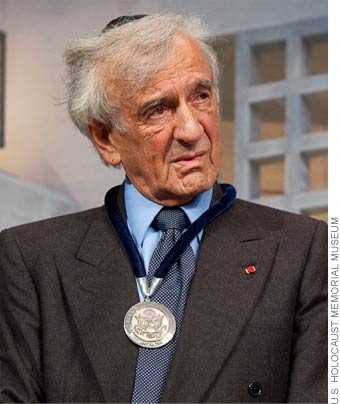
Saint Elie will be canonized in the Catholic Church — expect it! And the Media and public will eat it up.
This brings me back to my original thesis that no one can defend Elie Wiesel’s story with solid evidence. No one ever has. Try to give me an example where you think that has been done. We’re always confronted with sentimentalism and emotional manipulation to cover than lack, which has gotten pretty tired by now. The Elie Wiesel drama is a story, a fiction, make-believe from start to finish. Wiesel only allows himself to be interviewed by friendly Jews, but even at that, he says a lot of things that give him away. He always tells his story just a little differently. But one has to want to see reality in order to notice it. Elie Wiesel’s fans don’t want to notice it. And the mainstream media doesn’t either. When he dies, will we see his life story presented in a major Hollywood movie? You can bet on it … or gag on it. He may have already made known his preference for who should play him.
7 Comments
Category Featured | Tags: Tags: Elie's tattoo, Holocaust fraud, Night,
Social Networks: Facebook, Twitter, Google Bookmarks, del.icio.us, StumbleUpon, Digg, Reddit, Posterous.
Wednesday, June 1st, 2016
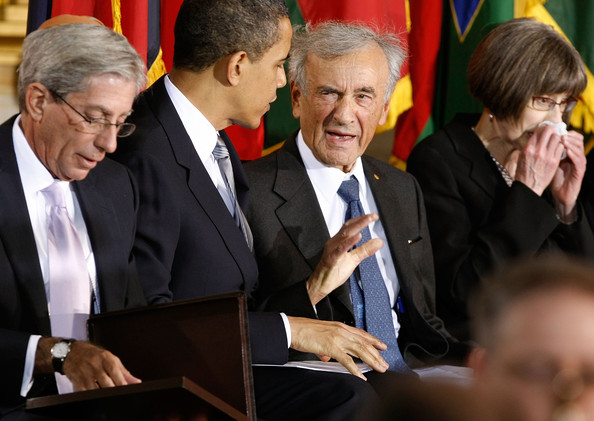
Elie Wiesel shows his ugly side in an unguarded moment during a “Holocaust Remembrance Day” ceremony at the U.S. Capitol Rotunda in 2009.
By Carolyn Yeager
TIFFANY YEP, LINKING TO a Google page of that name, wrote a comment to my article “Elie admits he doesn’t have the tattoo A7713.” I thought it called for more attention than a comment usually gets so I’ve made an article out of it. Tiffany is apparently in high school, and I can say the generation gap between us is pretty vast since I don’t understand her Google page at all. (I’m sure I’m not supposed to.) The comment, however, is easy to understand and I’ve seen quite a few like it. However Tiffany, being pretty bright, adds a slight twist. She says that Elie Wiesel’s version of what took place in the concentration camps, even if he made it all up, is still more valuable as a teaching aid than are more forgiving stories because he portrays the “horror” the Jews felt. I noticed on Yep’s Photo page a couple of holocaust horror pictures – one a very dishonest composite with Dr. Mengele, taken from an exhibit. Here’s her comment to me, all packed into one paragraph:
Tattoos can easily fade over the course of many decades. Even if he is not truly a survivor, his book “Night” has done wonders to teach people what went on in concentration camps. All you hear are tales of bravery and resistance and love from books about the Holocaust. These books betray the true horror of the Holocaust. Many of the survivors did not speak of what if (sic) actually felt like to be imprisoned in Auschwitz or Monowitz. Wiesels’ novel, real or not, accurately displays the anger and helplessness felt by the Jews in Germany and Poland and in other parts of Europe. Even if you are right and he is conning people, he still deserves that Nobel Peace Price (sic). Millions of youths from around the world have learned from “Night”, and in order to mot (sic) repeat history, we must learn the history. he could also have removed the tattoo, since his entire life does not center solely on his novels, and he can possibly be triggered when looking at the tattoo. If you haven’t picked up what I’ve been saying in this essay, basically a) you call him an idiot if he removed the tattoo because he wrote the books-he has his own feelings outside of proving he was at Auschwitz, and he may be triggered by the tattoo and the memories behind it, and b) even if he has never set foot in Auschwitz, his book has still done wonders to educate people on the honest horror and devastation in the concentration camps, versus the stories of faith and love and selflessness of people who managed to avoid it. And answer this question-if he was never in a concentration camp, how on earth was he able to depict them so accurately?
Let’s take the first sentence, Tattoos can easily fade over the course of many decades.
Yes, they can fade, but do not become invisible. “Most tattoo inks will fade over time but never fade away completely. The edges of the tattoo usually become less defined with time,” says the sharpologist. Tattoos are applied to the Dermis, which is underneath the Epidermis (top layer of skin). The Epidermis replenishes itself by forming new skin cells, but the Dermis does not. Tattoos are permanent, although will experience some fading over decades, according to this site.
This page should convince Tiffany that her theory of Wiesel’s vanishing tattoo cannot be right. Please notice the pictures of Auschwitz survivors who are more than willing to show off their tattoos. There is Samuel Bradin (now 86), Henry Flescher (now 92), Leo Zisman (now 84), and Paul Argiewicz (died in Dec. 2013 at age 88). Notice that each of their tattoos is somewhat faded but still very visible.
Elie Wiesel is now 87, in the same age group, but he does not “show” his tattoo because he doesn’t have one. If he had one, it would be just as visible as those of his contemporaries. Wiesel stands out at this event where he was the main speaker as being the only Auschwitz survivor who doesn’t pull up his sleeve. No one would dare ask him to, either. To any but the willfully blind, this behavior (along with photos of his bare arm) proves that Wiesel never had an Auschwitz tattoo.
The next amazing statement Tiffany makes is “Even if he is not truly a survivor, his book “Night” has done wonders to teach people what went on in concentration camps.”
So where did he learn what went on in concentration camps if he had not been in even one of them? I doubt Tiffany is aware that Wiesel gets angry when people suggest his book is a novel, not his faithful testimony. But what Tiffany is actually saying is that people who weren’t there can teach us what it was like to be there just as well or better than people who were there. Read that sentence again. The reasoning goes that those who make it up, who invent stories out of whole cloth, can write more interesting books than those who tell it as it actually was. Does Tiffany likes the gory stuff because that is the focus in her school holocaust lessons?
She’s saying that Wiesel’s novel, whether real or not, is still accurate in it’s depiction of how the Jews felt. No! What is not real cannot be called accurate. Wiesel know Jews, there’s no doubt about that. He describes Jews as he knows them, inside a concentration camp of his own invention, creating peculiar Jewish conversations. When the reader can relate to the characters, and live the event and feel the feelings vicariously, that is a successful novel. But to be a testimony, it has to have actually happened. Tiffany doesn’t care about such distinctions; she wouldn’t bat an eyelash over Wiesel’s own admission that what he writes isn’t true. He has famously admitted in various versions:
“In literature, certain things are true though they didn’t happen, while others are not, even if they did.”
He’s confessing that he’s writing “literature”, not testimony – literature being imagination and story-telling, testimony being a faithful account of what one has observed. And Tiffany goes along with that because she approves of super-charging the story-line to better get the point across.
Finally, she says. even if he is conning people, he still deserves that Nobel Peace Prize. For conning people?! If the Holocaust is a con (not just by Wiesel), then it is not history. Therefore, there has to be some reason that it is pretending to be history. If we learn not to repeat what never happened anyway, we are learning nothing. What should we be learning instead? We should be learning why and by whom this Holocaust con has been brought to us, that’s what.
When invention and 2nd-3rd hand information are offered in place of faithful testimony, it is then a lie. A LIE cannot be accurate. Tiffany would do well to try to understand the moral distinction. All her nattering about Wiesel’s feelings is meaningless, since she doesn’t know him or his feelings. Rather than imagining what he feels, she would do well to read Holocaust High Priest by Warren B. Routledge and learn something about the real Elie Wiesel.
Wiesel has also done nothing for peace. He is unqualifiedly pro-Israel and Israel is an aggressor-nation ever since it was allowed under strict rules in 1948. It has broken every rule and also sureptitiously developed powerful nuclear weapons. How does the promotion of the false holocaust story bring about peace in the world? Israel and Jewish surlievers collect ever-increasing amounts of money from Germany, along with nuclear submarines, and also huge amounts of money to buy armaments from the U.S. So much is given to Israel there is not much left for anyone else.
At the end of her comment, Tiffany does me a favor by asking me to: Answer this question-if he was never in a concentration camp, how on earth was he able to depict them so accurately?
Oh, so easy. He didn’t! That is what most of the articles on this website are about – how his stories about Auschwitz and Buchenwald don’t fit the official narrative – and contain numerous inner and outer inconsistencies and contradictions. There is nothing accurate about his descriptions (or lack thereof) of Auschwitz, Birkenau, Monowitz or Buchenwald. He waited 10 years to write his “testimony” in order to have other reports to model his on, not because of the fatuous reasons he gives—and he still got most of it wrong! No, clearly, Tiffany doesn’t have any idea what is accurate when it come to the “Holocaust” or to Elie Wiesel, but I will venture to say she likes the story the way Wiesel tells it because it makes her feel good about herself – she is one of those who will make the world a better place.
So now Tiffany, how about answering a question for me: How on earth can you believe something you know so little about?
By what inner workings have you accepted what you were taught in school without applying any critical analysis? Was there a critical element involved in your Holocaust Study unit? Were students comfortable in asking questions of a critical nature? Do you consider yourself well-educated about Elie Wiesel and the “Holocaust?” Will you even ask these questions of yourself?
Maybe someday you will. I’m glad you let me know that you have read this site. I invite you to read and comment more, as I would be more than happy to get into a dialogue with you.
8 Comments
Category Featured | Tags: Tags: Elie Wiesel, Night, Tiffany Yep,
Social Networks: Facebook, Twitter, Google Bookmarks, del.icio.us, StumbleUpon, Digg, Reddit, Posterous.
Saturday, March 19th, 2016
BY CHRISTINE MILLER
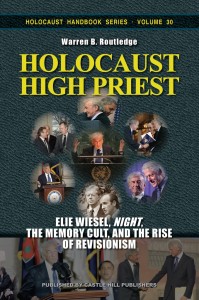
Holocaust High Priest by Warren B. Routledge, published in 2015.
I ACQUIRED THREE COPIES of Holocaust High Priest: Elie Wiesel, Night, the Memory Cult and the Rise of Revisionism, by Warren B. Routledge. I intend to give one copy to the Marshfield (Wisconsin) Public Library (if they accept), the other copy to Stratford Public Library and one is for myself. I was very interested in what the author, Warren B. Routledge, has to say about Elie Wiesel’s book Night, since I also challenged Night on December 1, 1997. At that time I was still a busy teacher, housewife and mother without sufficient time, nor do I have the meticulousness nor the inclination to be as thorough as Routledge. Neither was I ever at Auschwitz, therefore could not cite the mistakes which Routledge points out that Elie had made in describing the location.
Mr. Routledge has also done meticulous research on dates which are inconsistent. My earlier challenge kept to what to me were obvious absurdities which Routledge has neglected or overlooked. Thus it may be worthwhile to review my challenge.
An appeal to reason
December 1, 1997
Dear Members of the Board:
When Mr. Markwardt, head of Marshfield Public School Libraries, wrote (June 3, 1997): “The German people should suffer a shared guilt that should last many generations,” he invigorated my resolve to fight the gas chamber-holocaust lie. The next generation are my children. Does he and his fellow travelers in spirit really think that I would sit back while they press the mark of Cain on my children’s foreheads? I hereby request that the Marshfield school libraries eliminate “Night” by Elie Wiesel. 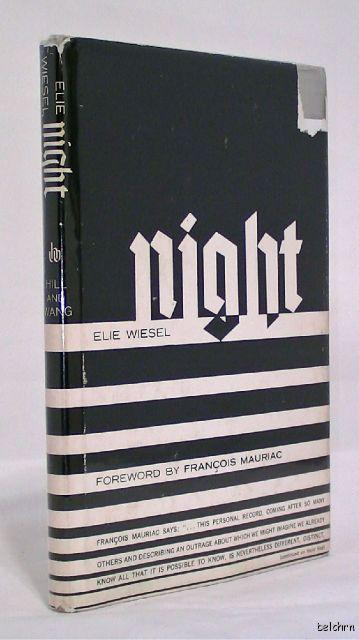
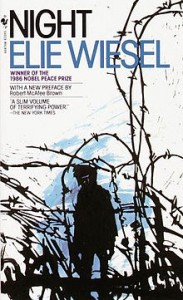
This is the original “Night” paperback from which the quotes in this article were taken.
“Night” is like a Monte Python skit with this difference. In a Monte Python skit the absurdities are funny. In “Night” the absurdities are pernicious and meant to indoctrinate our children with hate.
There is the Pythonesque episode of the baby toss. “Babies were thrown into the air and the machine gunners used them as targets.” – Machine guns are not used for target practice , but for sweeping a wide field from side to side.
There is the Pythonesque episode of a wildly shooting Gestapo who, instead of shooting at the neck, shot Moshe the Beadle in the leg. “Each one (Jew) had to present his neck … How had Moshe the Beadle escaped? Miraculously. He was wounded in the leg and taken for dead …” – This really must have been a miracle in the truest sense of the word.
There is the Pythonesque episode of the copulating youngsters in an overcrowded train. However, there is one difference. In the skit, only cartoon characters are made to copulate. “Free from all social constraints young people gave way openly to instinct, taking advantage of the darkness to copulate in our midst.” – Our high school students are very liberated, but I cannot imagine any of our sweetheart couples copulating in a train so crowded that the act would have to be performed standing up. Much less can it be imagined of these Jewish youngsters brought up within a society of strict sexual morality, a society which did not condone dating but still relied on matchmakers. I think Elie has a dirty mind.
There is the Pythonesque episode of Juliek playing his violin in a space so crowded that the dead were heaped upon the living. Elie Wiesel asks: “How had he (Juliek) managed to free himself?” – My question is: How had Juliek managed to get his fiddle out uncrushed, and how was he able to move his fiddle arm in order to play from a Beethoven concerto when at the same time Elie was crushed underneath bodies and had to battle for a mouthful of air? The next morning Elie found Juliek asphyxiated by the crush of people. I am not impressed with the reasoning prowess of most people. But nevertheless we expect a certain amount of reasoning and logic from adults which we do not expect from children. Children are therefore extremely vulnerable to atrocity propaganda. If you leave this book in our school libraries you are not doing right by our kids.
Sincerely yours,
Chris Miller
An appendix:
After that challenge I came across another book by Elie Wiesel: “Tous Les Fleuves Vont a Mer – All Rivers Run to the Sea – Memories.” In a long paragraph which I had to shorten (herewith my translation), Elie has this to say. (The whole paragraph has been expunged from the English translation: “All Rivers Run to the Sea,” Schocken Books, New York.)
“That trip in the train, I described it in my first testimony, needs clarification – and it is delicate. It deals with the erotic atmosphere which prevailed in the train. In the French version I say: ‘Freed from all social constraints, the young people gave way open to instinct, taking advantage of the darkness to copulate in our midst.’ [page 20, original Night] Then I rechecked the original version in Yiddish. There the passage reads differently … It describes the timid contacts which never exceeded the bounds of decency. [Not true – it is the same in Yiddish! -cy] How could I have translated that with: copulate? I do not know. … Perhaps I was speaking of myself. … For the first time in my life I could touch a woman. …
“The rest belongs into the realm of phantasy.”
Not only is this episode a case of Elie Wiesel’s phantasy, his whole story is. Routledge wonders if Wiesel ever had set foot into Auschwitz. After rereading “Night” I wonder about that too. “But we had been marching for only a few moments when we saw the barbed wire of another camp. An iron door with this inscription over it: “Work is liberty” (work is freedom)! Auschwitz.” [page 37, original Night]
My comment: Nowadays everybody seems to be familiar with the entrance gate (it is a gate, not a door) with the inscription: “Arbeit macht frei” (work sets you free).
“Work is liberty” is Orwellian like “War is Peace.” How could Elie have made that mistake? I attempt an answer. The French original of “Night” was copyrighted in 1958. During that time neither Auschwitz, Treblinka nor Sobibor were in the news. We Germans were still hammered with the gas chambers at Dachau, Bergen-Belsen and Buchenwald. But slowly a shift took place. The gas chamber stories in the camps on German soil could no longer be maintained. The camps inaccessible behind the iron curtain took their place as extermination camps. Elie Wiesel wrote “Night” before that shift had taken place and was therefore not familiar with the inscription.
Elie was deported at the age of 14. He claims to have had a golden crown in his mouth which everybody coveted, especially the foreman, Franek. A dentist finally broke it out with a rusty spoon. Mengele, whom Elie saw wearing a monocle, and Elie as a fourteen year old having a gold crown are metachronisms (meta, after + chronos, time), chronological errors. As the people of Marshfield don’t drive to Stratford anymore in a stagecoach, in 1940 nobody wore a monocle and a kid did not get a golden crown. A child had his tooth yanked, and only if he was lucky by a dentist. I also do not know how you can get a crown out with a spoon. Needless to say, with Elie, the spoon had to be rusty. [page 50-51, original Night]
After I had written my challenge I got the German translation, “Die Nacht.” In the preface it reads that: Elie Wiesel with his parents and younger sister were deported to Auschwitz. Only later on does the book talk about sisters who remain nameless. (These two sisters were hale and hearty after Auschwitz was taken by the Russians. His younger sister and his mother died most likely in a typhus epidemic). [That is, if they were ever there, and Mrs. Miller does question whether Elie was. -cy]
In the English translation there are no gas chambers. “When he (Bela Katz) heard of our arrival, he managed to get word to us that, having been chosen for his strength, he himself put his father’s body into the crematory oven.” In the German translation it reads: “Als er von unserer Ankunft erfuhr, liess er uns sagen, dass er wegen seiner Koeperkraft dem Sonderkommando zugeteilt und dadurch gezwungen worden sei, seinen eigenen Vater in die Gaskammer zu schieben.” In the German translation “Nacht”, all the crematory ovens of “Night” are turned into gas chambers. Western man has been made irrational. That was a necessity, otherwise he could not have been made to believe in the absurdities of the Holocaust lore.
In case you are interested:
March 6, 1998
Christine B. Miller
606 Cypress Avenue
Marshfield, WI 54449
Their reply
Re: Decision of Reconsideration Committee on February 12, 1998
This is to inform you that the Materials Reconsideration Committee of the School District of Marshfield voted to retain the book “Night” by Elie Wiesel on the shelves of the Library Media Center in the Junior High School.
You may contact me if further information is needed.
Sincerely,
Ken Krahn
Superintendent of Schools
~~
Christine B. Miller was born in Bavaria in 1935 and lived through the National Socialist regime and the 2nd world war as a child on her grandparent’s farm. She emigrated to the United States in 1956, went to college, married, raised a family and became a high school German teacher in Marshfield, WI. She has published two books: Reality Check and Feldzug im Osten (Campaign in the East). She was interviewed on The Heretics’ Hour in 2011 and 2012.
This essay first appeared in The First Freedom, March 2016.
2 Comments
Category Featured | Tags: Tags: Christine Miller, Holocaust High Priest, Marshfield Public School Libraries, Night, Warren Routledge,
Social Networks: Facebook, Twitter, Google Bookmarks, del.icio.us, StumbleUpon, Digg, Reddit, Posterous.
Saturday, March 5th, 2016
Followup of “Elie admits he doesn’t have the tattoo A7713”
By Carolyn Yeager
copyright 2016 Carolyn Yeager
![Elie Wiesel's left arm in bright sunlight in a still from his own video "Elie Wiesel Goes Home" - no retouching. [courtesy Eric Hunt]](https://www.eliewieseltattoo.com/wp-content/uploads/2012/01/EW_arm-no-tattoo1-e1450887466391.jpg)
Elie Wiesel’s left arm in bright sunlight in a still grabbed from his own movie “Elie Wiesel Goes Home” – no retouching possible. [courtesy Eric Hunt]
Turns out? How long do we wait for something to “turn out?”
Wiesel will be 88-years-old on September 30th of this year. Very few human bodies are able to carry on after their 90th year, so, without a consensus opinion from the revisionist community, we are looking at the prospect of an eternal “We’ll never know” pasted over the Elie Wiesel tattoo question. Naturally, this is what Wiesel supporters want, but should revisionists be content with never going beyond that, continuing to fear there will come a time he will dramatically pull up his sleeve for the cameras?
He’s already done so and we have the result in the image at right.
And what don’t people understand about logic? One doesn’t need a University course in logic to use common sense. Two plus two adds up to four – we don’t need a calculator to prove it, our fingers can tell us. What should we think of those who would say “But what if it doesn’t? What if our fingers turn out to be wrong?”
It’s the same logic we use when someone tells us he has a number tattooed on his arm that proves he was at Auschwitz in 1944 – we expect it to be shown to us. There is no reason we should have to take it on trust. Imagine yourself in a real life situation like that and you’ll get it. Those who are willing to accept a deal such as we have in the case of Elie Wiesel are either cowards, frightened serfs, or collaborators in the lie. But people are also ignorant of the facts – even though mostly through choice, and maybe also poor memory.
For this reason, I want to specifically address these persons to try to give them a little backbone … er, I mean background. You need to be clear about how Elie Wiesel got into this tattoo quandary to begin with.
To those whose reasoning goes, Why would Wiesel say he has a tattoo when he doesn’t have one? He wouldn’t be so foolish, therefore I have to assume he might have one. He also doesn’t need to have a tattoo to have been at Auschwitz, – they forget about the Yiddish book, Un di Velt hot gesvign (And the world remained silent), from which Night was taken. In that book, and carried over to Night, Eliezer and his father were tattooed on their left forearms with A7713 and A7712. It follows that if Night is Elie Wiesel’s own story, he has to have a tattoo.
On page 51, the author wrote:
The three “veterans,” with needles in their hands, engraved a number on our left arms. I became A-7713.
Now I hope you understand (and please don’t forget it again) why he has to have that particular tattoo, and why he has always said he does have it. He has no choice. The fact that it has never been shown to the public speaks volumes (never underestimate his belief in his ability to fool the public), as well as the fact that we’ve seen his uncovered left arm in photographs and there is no such number there. What more proof do you want? The final nail in the coffin is that Wiesel and the people around him remain silent about it – they will not allow the question to be asked. That is the “admitting” part.
So it’s settled – Wiesel has no tattoo, and he admits as much. He’s kept up the lying charade so long because he could! No one challenged him. Once again, I will give credit to Jew Michael Grüner for breaking this open, even though he makes up plenty of ridiculous concentration camp stories himself. But Grüner got the documents and made them public, along with explanatory letters from Auschwitz and Buchenwald.
If Wiesel is not a concentration camp survivor, we need to look into other possibilities for his whereabouts in 1944. We will not be able to prove anything – this period of time could not be more confused. Displaced persons and self-identified camp survivors were flocking into Western Europe in search of opportunities; they were creating new identities and applying to go to Israel and to America. In all of this, it’s impossible to find any kind of a trail. But some pathways are more plausible than others for the Wiesel family.
Wiesel’s family is not found in records at Auschwitz
Speaking of documents, do you know there is no record of any member of Wiesel’s immediate family at Auschwitz? That’s a fact. In addition, the only record, as far as I know, of Elie’s two older sisters being at the Dachau sub-camp Kaufering comes from a book put out by the “Central Committee of Jews in Bavaria” in 1946. They published a list of 61,387 Jews in a book named Sharit Ha-Platah (translates as “Counted Remnant”), among which are listed Hilda and Bea Wiesel. The names were collected by Chaplain (Rabbi) Abraham Klausner, who is said to have visited many of the camps in southern Germany where survivors gathered in late 1945 and 1946. You better believe the Rabbi wanted to get as many names as possible, and that there is nothing official about this list.
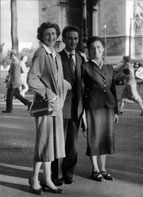
Bea, Elie and Hilda Wiesel in Paris after the war.
We first meet up with Hilda and Bea as refugees in Germany, just as we first meet up with Elie at a Jewish orphanage in France. Hilda Wiesel married an Algerian Jew and moved with him to Paris. She has since spoken about her family’s deportation in a Shoah Foundation videotaped interview, but without details of what happened after they arrived at Auschwitz. Her sister Batya (Bea) emigrated to Canada and never spoke publicly about it at all.
Hilda’s Shoah Foundation testimony which she gave in 1995 (coincidentally the same year Elie’s official autobiography All Rivers Run to the Sea came out) differs from her brother’s story in Night in numerous details. Relevant here, she said:
We were deported on 15 May [1944]. We heard around 1943, because we had family in Belgium, we heard that they had deported a cousin, but we didn’t know where to …
I can only tell you one thing, that the third transport – we had to stand 5 by 5, five abreast – there were Hungarian gendarmes, hardly any Germans, mostly Hungarian gendarmes.
We were myself and my sister, the one who was in Canada and is now deceased; my mother; my grandmother, that is my father’s mother; and, oh … my little 10-year old sister. And we arrive in Auschwitz, the men were apart, my father with my brother.
According to the original Night and the Yiddish And the world remained silent, the family’s deportation date was June 3, 1944. In Marion Wiesel’s re-translation, it was changed to May 20. So which is correct? Most likely none.
Hilda also tells us the women and men traveled in separate cars.
My mother knew there was no hope, because she told me and my sister, always stay together, always stay together. And she said, go tell your dad to always stay together with Elie. And I ran over to him and said, Papa, stay with Elie, stay with him – like that.
Q: This was on the train, that you are describing?
A: No, it was after getting off the train.
If they were in the same train car, Mother could have told her husband herself. But Night and its Yiddish precursor describe the boys and girls having sex together in the darkness of the train, freed from following the usual rules, and Wiesel says he was traveling with his mother and sister — everyone was together. Let me make clear that I don’t have any more faith in 70-year old Hilda Wiesel Kudler’s testimony than I do Elie Wiesel’s “stream-of-consciousness” autobiography, which, as I said, coincidentally appeared at the same time in 1995. And I am not convinced by this that the family really went to Auschwitz since not one of them was registered there, nor do their names come up on any hygiene or other reports even though they were supposedly put in quarantine. We do find Lazar and Abraham Wiesel, and Myklos Grüner, his father and brother listed on a hygiene report.
I’ll also add that Mother, Grandmother and youngest sister [10 years-old according to Hilda Wiesel, but 7 years-old according to Elie in Night, where Grandmother is not included] are understood to have been sent directly to the “gas chamber” and gone up in smoke through the chimney shortly thereafter. Since homicidal gas chambers didn’t exist, all the women would have been sent to the showers, gone through the disinfection process, given new clothing and assigned to a women’s barrack, the same as Wiesel writes about Eliezer and Father. However, a grandmother and mother with a child would have been assigned to non-working barracks; the two 20-somethings to barracks for female workers.
A very odd fact is that both in Night and in the Yiddish book, Eliezer and Father never mention their wife, daughters, mothers and sisters again. They don’t look for them, talk or ask about them, as other people did. They apparently accept being told that their loved ones “went up the chimney” and immediately become concerned only for themselves. I don’t believe this; it’s not human nature, it’s make-believe.
So if not there, where else could the Wiesel family have been in 1944?
Following a trail of possibilities
Well, we do have Shlomo and Mendel Wiesel’s first cousin Yaakov Fishkowitz filling out a Yad Vashem Page of Testimony for each of them, reporting they both died in 1943 in a “labor camp.” If Yaakov didn’t believe this were true, why would he have done this in 1957 at the same time he filled out other pages for relatives he marked as being sent to Auschwitz in 1944? He also said Shlomo was born in 1903 and Mendel in 1905.
Add to this the very weak story Elie Wiesel gives for why his family didn’t do something to protect themselves from the “Nazi menace.” On page 8 of Night, Wiesel wrote:
In those days it was still possible to buy emigration certificates to Palestine. I had asked my father to sell everything, to liquidate everything, and to leave. ‘I am too old, my son,’ he answered. ‘Too old to start a new life. Too old to start from scratch in some distant land …’
Too old at the age of 41? Fishkowitz puts his birth in 1903. Other than that, there is no official birth date for Elie Wiesel’s father. In a close family, children always know their parents’ age and birthday. Hilda said her mother was born in 1900. So Shlomo Wiesel’s age is being covered up by son Elie, who left blank the DoB space on the Page of Testimony he filled out for his father. We can say that the oldest Shlomo could have been was 48, but more likely younger. Wiesel has always made his father out to be a tired old man, especially in Night. I have distrusted this characterization and believe it was a literary device to make the story more poignant, just like turning 10 year-old Tsipora into a 7 year-old.
The following interesting passage is on page 27 of the Yiddish Un di Velt hot gesvign, but is not included in the shorter French or English Night:
We had opportunities and possibilities to hide with regular goyim and with prominent personalities. Many non-Jews from the surrounding villages had begged us, that we would come to them. There were bunkers available for us in villages or in the mountains. But we had cast aside all proposals. Why? Quite simple: the calendar showed April 1944 and we, the Jews of Sighet, still knew nothing about Treblinka, Buchenwald and Auschwitz.
Two things here. It again says it was April, not May, when the Sighet Jews first learned they would be deported. It confirms the passage on page 83 of the Yiddish book: “It was a beautiful April day,” said on one of their first days in Auschwitz-Birkenau.
The other thing – it is not true the Jews of Sighet knew nothing, yet that is what Wiesel writes in his autobiography All Rivers, while at the same time he also writes of Polish Jews passing through their neighborhoods telling stories of terrible atrocities by German occupiers. He says that non-Jews offered the Wiesel family places to stay. Wiesel writes that their Christian maid Maria begged them to come to her village and she would keep them safe. How many Jews may have taken advantage of such offers? But we’re told that Shlomo Wiesel refused to accept this kindness of Christians, and Elie’s only explanation is that they still didn’t believe the stories they were hearing. Then he blames the world for not warning them! This can be found in All Rivers Run to the Sea, on page 63 and 68-69.
Isn’t is possible the reason we find mention of these offers of help in all three Wiesel books is because it was such an important part of his experience that he felt compelled to include it? His family hid out and were protected from arrest. Or … maybe only he was sent away for safety, and his mother and sisters had different experiences. His father too, unless he did indeed die in 1943.
After the war, when only Elie and his two older sisters reunited, it was convenient to say the others were “murdered” in Auschwitz. That was the preferred story at the time. After all, with an advertised death toll of four million until 1990, there was plenty of room to say hundreds of your relatives were exterminated there.
In France
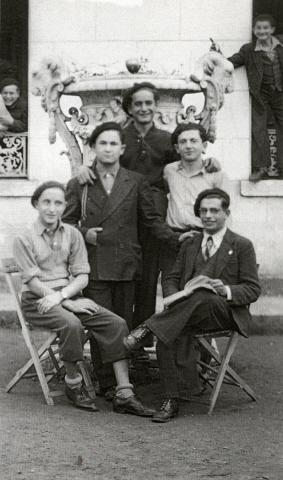
Elie Wiesel is center-top with a group of friends all wearing berets, at Ambloy, France in 1945.
Wiesel could have been sent to the home for Jewish orphans in France after the war from wherever he had been staying. In the few photographs we have, he looks cheerful and well-adjusted. He has friends, and seems to be a leader of younger boys. His hair is very long in the front, too long to have grown out from a concentration camp shaved head just a few months before.
From his very first year in France he was extremely interested in Zionism, the struggle in Palestine, and was a supporter of the Irgun, the Jewish terrorist organization in Palestine. Where did he learn all this, since he says that while in the camps he had no interest in anything. This is another reason to suspect he sat out the “Hungarian Holocaust” and was staying in a safe political environment somewhere.
I have written so many details in the various articles on this site that suggest or show outright that Wiesel has lied about many, many things – that he is faking it when it comes to so many aspects of his story. It’s not like he’s a paragon of truthfulness and I am therefore going out on a limb, or defaming him, by questioning the basics of his story. What really gives me a justification to do so comes back to – yes, that’s correct, his lack of a tattoo!
I think it shows that Wiesel and his friends know how damaging this tattoo business is by the fact they won’t speak about it – they completely refuse to deal with it. The Jewish Shoah believers in France at Enquete & Debat tried but could not get Wiesel to answer any questions about the tattoo by writing to him at his Foundation office in Romania. After a period of time they phoned there and Wiesel’s assistant hung up on them as soon as she realized what they were calling about. If holocaust-believing Jews are treated that way, it tells us just how unwelcome the topic is.
As I’ve said before, the only way to bring attention to Wiesel’s serious tattoo problem is to make a lot of noise about it – to get public attention on it. This is not happening and will not happen as long as the general response is: Forget the tattoo because it might turn out that he has one.
The cowardice in such a position leaves me flabbergasted. It’s half ignorance, as I said above, that is true, but the other half is lack of nerve. I am doing my best to dispel the ignorance. Those promoting the Wiesel legend lie, lie, lie, lie, lie and it doesn’t bother them in the least, while the truth forces are afraid of being wrong when the odds for being wrong on this are 5% or less – to me, it’s 0%. To continue to be content with just asking the question “Is it possible that Elie Wiesel doesn’t have the tattoo he said he does?” and fail to go beyond that to a declarative statement on the matter is not an acceptable outcome considering all we know.
It’s time to put all doubts aside and claim the obvious.
8 Comments
Category Featured | Tags: Tags: Auschwitz, Elie Wiesel, Hilda Wiesel, Night, Shlomo Wiesel, Un di Velt Hot Gesvign, Where's the Tattoo?,
Social Networks: Facebook, Twitter, Google Bookmarks, del.icio.us, StumbleUpon, Digg, Reddit, Posterous.
Thursday, January 7th, 2016
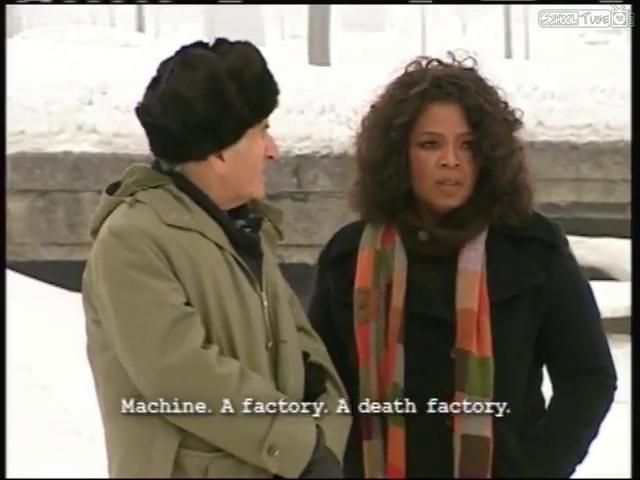
Elie and Oprah star in a very boring film about … walking around in the snow. Here they are in front of the Auschwitz 1 crematorium, feeling the horror.
By Carolyn Yeager
The Germans have been accused of making soap from jewish corpses in Auschwitz , but it takes a jew to make a soap opera there.
Victim Elie Wiesel and victim enabler Oprah Winfrey made a soap opera at Auschwitz on January 29, 2006, exactly ten years ago. The two superstars, along with Winfrey’s film crew, met in front of the entrance to Birkenau and much of that filming was added to the documentary created later in-studio by Oprah’s production team. The resulting 45-minute “movie” was broadcast as part of The Oprah Winfrey Show in May of that year.
Recall it was thirteen days earlier on Jan. 16 that Winfrey announced the “new 2006 translation” of Elie Wiesel’s Night as her newest book club selection. The next day, Jan. 17, Amazon announced it was changing the category of Night from novel to memoir. A lot of questions were raised (as it was known they would be), and the Elie-Oprah Auschwitz trip was intended to distract attention away from those embarrassing questions … to reinforce to the public that Wiesel was a genuine, suffering “death camp”survivor and Night was unquestionably his true story.
It was, in my opinion, a business venture that the advisers to both parties worked out as part of the entire deal between Oprah and Elie. All that the two headliners had to do was show up and act out the roles they knew so well. Oprah has referred to Wiesel as “my world hero” and said she was never the same after reading Night; she was the perfect gullible, unquestioning foil for him.
It was assumed by Oprah and the manipulated public that Wiesel would be her guide to a place he knew well. (And it would have been a perfect time for him to show his tattoo to the camera … if he had one.) But as I will point out, Elie’s words, or lack of them, expose him as a stranger to that place. He tells fiction after fiction, taken from lurid survivor testimonies that were discredited long ago. The only things he really describes are his emotions, his feelings, his thoughts … which become boring and are not convincing either.
In the film @3:43, Elie says, “Each time I come, I – I try not to speak for a day or two or three … ” but from what I can discover, this was only the 3rd time Wiesel had been there. The first was on Janurary 27, 1995, when he spoke at the 50th anniversary of the so-called liberation of the Auschwitz-Birkenau camp. It was probably on this same trip that he filmed a documentary beginning in summer 1994, both in Sighet, Romania and in Auschwitz-Birkenau in Poland. In that film, “Elie Wiesel Goes Home,” he is shown silently walking around the Birkenau grounds with his shirtsleeves rolled up, revealing bare arms with no sign of the tattoo A7713 he says he still has. (He said this as late as 2010.)
This 3rd and last time he made the film with Oprah, which was titled “Auschwitz Death Camp“. The lies and just plain ignorance that are packed into this program is amazing. I will refute some of it here. Elie actually says very little in the beginning but reads passages from Night in order to not speak such stupidities on camera. It is understood by most reasonably sophisticated people that Night is a creative effort—not to be taken literally. Notice that in the film he doesn’t describe his life in the camp with any detail–no names, specific persons, places, events—only generalizations anyone could come up with. For instance, standing in front of Block 17 in Auschwitz 1, where he says he lived, he claims he thinks often about those who died there, but doesn’t offer a single name or how they died.
Oprah takes in every word from the “Professor” (as she calls him) as profound, and though she responds in her trademark super-sympathetic manner, it does seem that she would have liked something more solid from him. She seemed to me to find her hero’s wandering, empty thoughts unsettling – and was pretty much left speechless. This has to be why her production team added so many background film clips and photos portraying the usual media version of the holocaust story—to add some content to a boring walk in the snow with an old con man. Sorry, but if you pay close attention, you should come to the same conclusion.
The main errors refuted
I link to the pages on Oprah.com that I am commenting on, and highlight the offending passages in boldface, so that you can follow and compare.
http://www.oprah.com/world/Inside-Auschwitz/1
As young Elie Wiesel stepped off the cattle car at the Auschwitz subcamp Birkenau, also known as Auschwitz II, he smelled the stench of burning human flesh and saw the crematorium throwing its flames into the sky. “[Mrs. Schächter] wasn’t so mad at all,” Oprah says. “She was a prophet.”
Oprah shows exceptional ignorance by believing that flames could be coming out of a crematorium chimney, but this is what was written in Night. She even believes in Mrs. Schacter, who is simply a character Wiesel invented.1
There was no stench of burning flesh in the air at Birkenau, in spite of quite a number of “survivor novels” that say so. Operating crematoria do not release any smell. Wiesel picked up that idea of “stench” from the testimonies at the Nuremberg tribunal and Soviet reports. In 1955 he thought it was safe to say such things. Today we know what he wrote did not happen.
http://www.oprah.com/world/Inside-Auschwitz/2
The systematic process of determining who would live and who would die was known as “selection.” SS officers briefly sized up each new arrival. Those deemed capable of hard labor, like 15-year-old Elie Wiesel and his father, went into the work camp. All others were sent immediately and unknowingly down the path to Auschwitz’s four gas chambers.
The “selection” was for work placement, not life or death. Those who could not work (children, elderly and sick) went into the barracks at Birkenau where they were fed and allowed to join in activities. There was actually a lot going on. Mail was delivered in both directions, packages were received, the health clinics and hospitals were busy. Some did light work in the camp. Even babies were born.
No one went to a gas chamber because there were none. Wiesel never, ever spoke of a gas chamber in his book Night, written in 1954, and further edited from 1956-58. He only spoke of people taken to the crematorium after they died, which to him at that time was only from disease, hard work and mistreatment—not gas chambers!
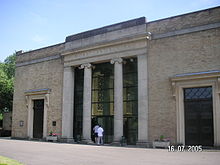
West London Crematorium, 2005
Those selected to die were told they were getting showers, then packed into the chambers by the thousands. Canisters of the deadly chemical Zyklon B were dropped in. As the toxic pellets mixed with air, cyanide gas was released. Death took about 15 minutes to come and felt like suffocation. Proud of their efficiency, SS officers witnessed the gassing as it happened through special peepholes.
None of this is true. Shower facilities were real showers, an important part of the camp disease prevention program.
“Canisters of Zyklon B were dropped in”? What would canisters do? Does Oprah expect that the ‘victims’ opened the canisters themselves?
Death from Zyklon B poisoning would not feel like suffocation. Death by poison gas is painless; one just drifts into unconsciousness.
Claiming that SS officers watched people die through peepholes is the lowest form of defamation of Germans—one thing that Wiesel specializes in. He is pawning off this gruesome “camp gossip” to Oprah and she is not questioning it. But later in the video she did keep saying she “couldn’t understand” how human beings could do such things. The answer is they didn’t.
The grisly task of burning the dead bodies in underground ovens was left to Jewish prisoners. Forced into this horrific job, they temporarily evaded their own death.
What is meant by “underground ovens”? There was no such thing. There were above-ground crematoria for hygienic disposal of human corpses, exactly the same as are found all over the world. There is nothing sinister about cremation retorts. Oven is a word meant to mislead people by bringing up images from the fairy tale “Hansel and Gretel!”
It doesn’t say much for jews if they agreed to kill and cremate their own people just to put off their own death for a short time. There is no way to force someone to do this. This is one of the weakest links in the Jewish Holocaust narrative.
http://www.oprah.com/world/Inside-Auschwitz/3
Professor Wiesel takes Oprah inside one of the few barracks still standing at Auschwitz. He says that prisoners were packed two or more to a bunk on straw mattresses. Professor Wiesel slept on similar bunks at Auschwitz and later at Buchenwald.
Wiesel never wrote of sleeping two (or more) to a bunk. He wrote that at times he was on the top bunk and his father on the bottom. In Buchenwald there was never two to a mattress, especially in the children’s barrack.
Most people don’t find straw mattresses unpleasant to sleep on, especially if they’re tired enough, but most of the people living in Birkenau actually didn’t do much in the way of work and exercise.
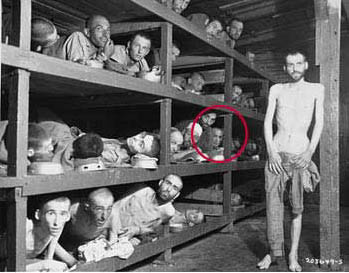
“Elie Wiesel looks out from the far right of the middle bunk.” This photo was staged in an empty barrack because the mattresses have already been removed, 5 days after liberation.
In this photo, taken by soldiers on April 16, 1945, after the liberation of Buchewald, Elie Wiesel looks out from the far right of the middle bunk.
That is not Elie Wiesel in the photo. That person looks nothing like him, but also he writes in his various memoirs that he became seriously ill with food poisoning two days after the April 11th liberation and was taken to a hospital where he stayed for two weeks. Think how ludicrous it is that he should claim to be in both places at the same time! This should tell you something about Wiesel’s irresponsibility when it comes to the holocaust narrative. Anything goes.
Rats, lice and other vermin were rampant. Deadly outbreaks of dysentery, typhus, tuberculosis and malaria wiped out entire sections of this camp. Inmates wore thin cotton uniforms year round, even in the harshest winter. Given only meager rations of stale bread and meatless soup, many starved to death. For prisoners not sentenced to die in the gas chambers, the average life span was barely four months.
Complete nonsense. The barracks at Birkenau were cleaned and disinfected regularly. Wiesel even writes about it in Night.
There are photographs of outdoor workers wearing heavy coats, boots, caps and gloves in winter.
NO ONE STARVED TO DEATH. The emaciated inmates at the end of the war were afflicted with wasting diseases, not starvation.
That the life span was 4 months is an invention picked up by Elie Wiesel from other “survivor stories.” Why then are there millions who were in the camps for several years and are now still getting a reparation check every month?
For saying these kinds of irresponsible things, Wiesel should be reprimanded by the Auschwitz-Birkenau Memorial staff, but he isn’t.
http://www.oprah.com/world/Inside-Auschwitz/7
At Auschwitz 1, the notorious Dr. Josef Mengele, known as the Angel of Death, conducted sadistic medical experiments on prisoners, infecting them with diseases, rubbing chemicals into their skin and performing crude sterilization experiments in his quest to eliminate the Jewish race by any means possible.
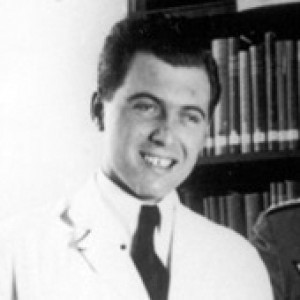
Dr. Mengele was a normal man who served humanity as a doctor.
All the stories about Mengele are inventions. True, he was interested in gaining knowledge about certain medical conditions but not in the way the crazy, narcissistic jews talk about it. He was actually a goodhearted man who has been made into a devil. Elie Wiesel never laid eyes on him anyway.
In Block 11, the secret German police, the Gestapo, interrogated and tortured political prisoners and anyone who dared to disobey.
The Gestapo had an office at Auschwitz. There was a good deal of sabotage and contact with the enemy carried out by Auschwitz 1, 2 and 3 inmates, especially the Poles who had a strong network with Warsaw and London. This could not be allowed and was punished severely. But the Gestapo didn’t regularly “torture political prisoners” or those who “dared to disobey.” That is more camp gossip. Good police know how to gather evidence and get confessions without torturing people. Block 11 was simply the camp jail and it has has been built up into a torture chamber, which it wasn’t.
“At least they had individual deaths—even this becomes a privilege,” Professor Wiesel says. “Here, actually, death was a release because it followed the torture.”
What’s he talking about? Nothing, it’s Wiesel-speak. We can’t know what he means by “torture” since everything is a torture for him. But he pushes the theme that death was preferable to life in the camps—at the same time he describes how he and everyone else clung to life. He preaches that the camps were places of continual punishment, which isn’t the reality at all. If it were, how would so many millions have come out at the end of the war in good health?
http://www.oprah.com/world/Inside-Auschwitz/8
A case filled with empty Zyklon B cans is a haunting reminder of the poisonous gas used by the Nazis for killing prisoners on a massive scale. “When the gas chambers were full, an SS man put on the gas mask, went to the roof, opened the little window there and threw such a can into the gas chamber,” Professor Wiesel explains. “Unspeakable pain and horror—that’s how they were killed. Mothers and children hugging.
Once again, the claim of mass killing is false. Prisoners were kept as healthy as possible in order to be able to work. And also once again, they’re throwing cans into the “gas chamber” through a little window in the roof. Pretty stupid of the SS men!
Also – once again – death by Zykon gas is painless.
“Mothers and children hugging” is pure soap opera fiction to effect the emotions of school kids and women like Oprah. It has been shown conclusively that there never were any homicidal gas chambers. It was black ops propaganda and is now just a plain old Big Lie.
http://www.oprah.com/world/Inside-Auschwitz/10
Baby clothes and shoes are all that remain of the death camp’s smallest victims. Infants were killed immediately on arrival, as were the young mothers who refused to leave their children.
No evidence for that at all. A few items of baby clothes is sure not evidence. The evidence shows that children were provided with kindergartens at Birkenau with painted murals on the wall. Babies were born at the hospital at Auschwitz. I could go on and on.
Wiesel is on overdrive to make Nazis guilty of unspeakable crimes … the better to extort billions from Germany for Israel.
In a short promo video, Oprah says to Elie “You saw the babies thrown into the fire” while an image of cremation “ovens” is shown on the screen. This is purposely misleading because Elie was speaking of babies thrown into open pit fires—but no one will believe that anymore. Wiesel won’t give up his “jewish-babies-burned-alive-in-fire” narrative because fire is part of the Jewish redemption narrative and it is the most evil curse he can put on the hated “Nazis.”
http://www.oprah.com/world/Inside-Auschwitz/12
The Nazis went to sinister lengths to profit from the extermination of millions, and no possible resource was wasted. Human hair shorn from victims’ scalps was gathered and sold to German factories to make cloth.
Human hair was cut short to control body lice that the jews and others brought with them to the camp–not to make a profit. They no doubt couldn’t have profited, considering all the barbers that were necessary. It was a life-saving measure.
What was done with the hair after it was cut was of no importance to the inmates. Do you want to keep the hair that is cut from your head? Do you worry that the salon or barber shop will make a profit from it? I doubt it. Wiesel tries to connect cutting of hair with extermination, but there is no connection. Failing that, he projects it as a humiliation.
Wiesel wants you to believe that the “Nazis” made money off the jews’ bodies by selling their hair, when in fact they were just making use of all resources in their wartime economy. Is it better to throw stuff away, or to recycle it?
Final thoughts
We could ask why Elie didn’t take Oprah to see the swimming pool. Or take her into one of the large kitchens, or the theatre. Or point out where the soccer field had been in Birkenau. Apart from the fact that he may not even know about this places, since he never lived there, both knew that bringing up that aspect of the camps would defeat the purpose and soapiness of their soap opera. Their purpose was to reinforce the stature of Elie Wiesel and his book Night, and a secondary benefit was to give Oprah more tear-jerking content for her TV show. In May 2011 Night was #3 on the Top Ten bestseller list from the Oprah Book Clubs in their final 10 years, according to Nielsen BookScan.
Winfrey did her best as an actress even though she broke character in a couple places, halting expressing her confusion about the story, saying she couldn’t make any sense of it. Wiesel immediately counseled her that she should not look for sense because none could be made of it. It is unexplainable and inexplicable … and a permanent mystery. As for upholding his part in making the film interesting, Wiesel totally failed. He was a bore. His Auschwitz experience remains preposterous and unconvincing—really just a soap opera.
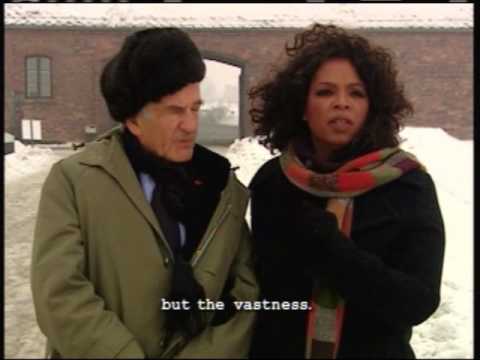
Endnotes:
- Wiesel said in an interview with the Paris Review in 1984:
Sighet, my little town, all the characters that I am inventing or reinventing, all the tunes that I have heard. It is always, whatever its name, that little town Sighet.
The real Sighet was actually the largest city in Maramures province with a population of 50,000 to 90,000 people, and was 35 to 50% Jewish … as written by Wiesel himself in Un di velt hot geshvign, the Yiddish precursor to Night. But in Wiesel’s other books, Sighet is a product of his imagination.
3 Comments
Category Featured | Tags: Tags: Auschwitz-Birkenau, crematoria, Jewish Soap, Night, Oprah Winfrey, Soap opera, Zyklon B,
Social Networks: Facebook, Twitter, Google Bookmarks, del.icio.us, StumbleUpon, Digg, Reddit, Posterous.
Sunday, December 27th, 2015
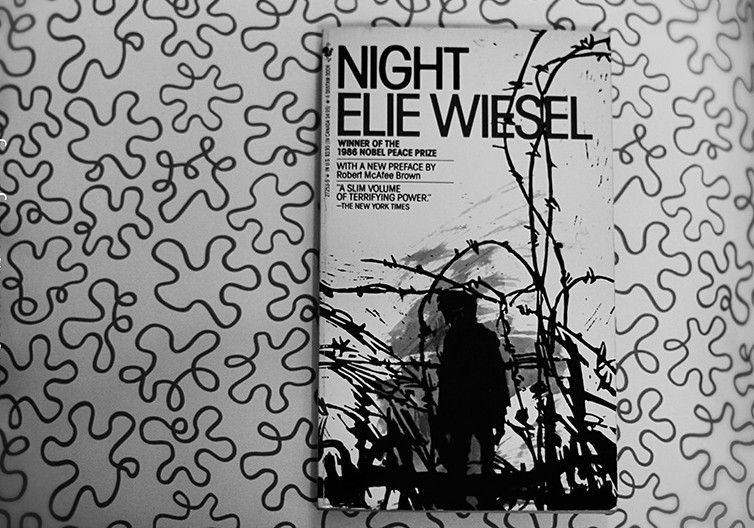
The original “Night” by Elie Wiesel is a puzzle for discriminating readers.
By Carolyn Yeager
copyright 2015 Carolyn Yeager
The pieces to the puzzle of Elie Wiesel and his book Night will never come together to form a coherent image. Readers and critics have long puzzled over the nightmarishly grotesque events that Wiesel presents as real, and refuses to repudiate. But he has actually given us the explanation all along—it’s just that it’s one so many don’t want to believe.
In his autobiography, Wiesel recounts a time when, visiting Israel, he went to see the “young” Rebbe of Wizhnitz, whose father he remembered with reverence from his childhood. At the end of the visit, which took two pages (273-75) to tell, the Rebbe questioned the young writer without being satisfied with his answers. Then:
The conversation became more relaxed. He asked me about my work. He wanted to know if the stories I told in my books were true, had they really happened. I answered not too convincingly: “In literature, Rebbe, certain things are true though they didn’t happen, while others are not, even if they did.”
I would have loved to have received his blessing.1
Notice that he first says he is writing “literature”2, not faithful accounts of his own experience. Next, we understand that by withholding his blessing, the noted Hasidic rabbi conveyed he was not pleased with the evasive answer of the Hasidic Jew Elie Wiesel. Wiesel himself says his answer to the final question was “not too convincing.” And finally, since Wiesel admits that he writes about things that never happened as being true, we can’t even be sure that this event happened, can we. This is the problem with everything in the life and work of Elie Wiesel.
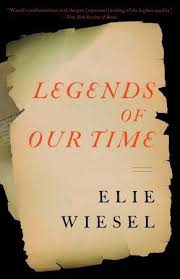
Legends of Our Time by Elie Wiesel
In a book first published in 1968, Legends of Our Time, Wiesel tells the story of that same visit to the rabbi this way: The Rebbe is troubled to learn that Wiesel has become a writer, and wants to know what he writes. “Stories,” Wiesel tells him, “…true stories”:
About people you knew? “Yes, about people I might have known.” About things that happened? “Yes, about things that happened or could have happened.” But they did not? “No, not all of them did. In fact, some were invented from almost the beginning to almost the end.” The Rebbe leaned forward as if to measure me up and said with more sorrow than anger: That means you are writing lies! I did not answer immediately. The scolded child within me had nothing to say in his defense. Yet, I had to justify myself: “Things are not that simple, Rebbe. Some events do take place but are not true; others are—although they never occurred.”
What are we to make of this? Truth loses all meaning; Wiesel acknowledges he tells tales that he wants you and me to believe really happened when he himself knows they didn’t. He doesn’t apologize either. He justifies. He deflects the rabbi’s sharp moral denunciation with his own measure of pseudo-mystification, in spite of the fact that his rebbe sees through him. And that is the way he is with the public too—even though it is understood by the intelligent critics that he is writing fiction, he keeps up the “witness” pretense for the gullible and the young.
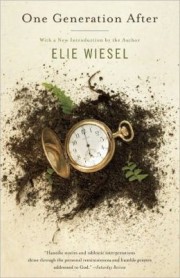
One Generation After by Elie Wiesel
In another book, One Generation After, first published in 1965, he wrote the same thing. He referred to it in a conversation with Giles Lapouge in 1970, which became a chapter in the book edited by Robert Franciosi, Elie Wiesel: Conversations (2012). The chapter was titled “Elie Wiesel, The Witness.” On page 33, Lapouge quotes Wiesel:
In [my] book “One Generation After” there is a sentence which perhaps explains my idea: “Certain events happen, but they are not true. Others, on the other hand, are, but they never happen.” So! I undergo certain events and, starting from my experience, I describe incidents which may or may not have happened, but which are true. I do believe that it is very important that there be witnesses always and everywhere.
There you have it—Wiesel’s method. He makes it up! And the overarching purpose of his efforts is to contribute to the well-being of the Jewish State of Israel. To Wiesel this is the greatest cause of all, for which he offers his writing ability to contribute to the “Holocaust” stories that are so crucial to Israel’s success. In this, Wiesel has joined a horde of other Jews who do the same, copying from one another, but no other “witness testimony” has had the impact of Night.
It should be understood that Wiesel has been a fervent Zionist since his youth—well before the deportation of Hungarian Jews. His whole family were Zionists, and his Father, according to Elie in several books, had spent time in a Budapest jail for involvement in smuggling operations, sending Jews, money, and probably weapons to Palestine.
Then he adds how necessary it is to have witnesses—all the time and everywhere! Sure, because the Soviet-Jewish-originated ‘Holocaust’ narrative, made up of outlandish events that never occurred, many of which Elie continues to insist did, needs witnesses to make it seem believable. It needs witnesses who cannot be easily doubted, so Wiesel paints all “survivors” as saints and martyrs who could not possibly make up the horrendous stories they tell. Elie is one of these martyrs.
It’s true, one of the most common questions one hears is: What reason would they have to lie? “A person would not lie about this kind of thing,” says charles, a commenter to this site. I’ve heard and read that many times. Yet, Elie Wiesel admits that he does! He just doesn’t call it a lie—but a lie by another name is still a lie. And many others have been caught at it: Fragments by Binjamin Wilkomirski, Angel at the Fence by Herman Rosenblat, Misha: A Mémoire of the Holocaust Years by Misha Defonseca, the Ovitz dwarf family’s story, to name just four that are well known.
Wiesel has repeated his idea that “some things are true that never happened and other things that happened are not true” too many times for us to ignore it. He has written it in four books documented here, and probably more that I don’t know about.3 It’s the key to what has been called “the riddle of Elie Wiesel.” But it’s no riddle, just that familiar Jewish talent for telling big whoppers … what he calls “storytelling.”
The Storyteller – an honored Jewish tradition

A Jew Today by Elie Wiesel
In another book, A Jew Today, a collection of essays published in 1979, the second essay is titled “An Interview Unlike Any Other.” In it he explains how he became a storyteller:
How did I become a writer? What was it that drove me to […] the role of storyteller. […] Everything hinged on chance, Birkenau, Auschwitz, Monowitz-Buna, Buchenwald: that very first night I might have joined the procession of old men and children.4 I might have remained in one camp and not reached the next. I might have passed through all four and followed my father into icy nothingness before the end of night. Liberated by the American army, ravaged by poisoned blood, I might have succumbed on a hospital bed, a free man. After being reunited with my comrades I might have missed the children’s transport leaving for France; I might have gone back to Translvania or elsewhere, done other things. I might have engaged in or endured other battles.
Yes, as a storyteller he has control and could have told it other ways, or not told it at all. Remember, true stories need not have actually taken place. In the first essay of A Jew Today, titled “To Be a Jew,” he tells a story of the hated “other” that he swears is true.
Once upon a time, in a distant town surrounded by mountains, lived a small Jewish boy
[…]
Naturally, this little boy felt at ease only among his own people, in his own setting. Everything alien frightened me. And alien meant not Moslem or Hindu, but Christian. The priest dressed in black, the woodcutter and his ax, the teacher and his ruler, old peasant women crossing themselves as their husbands uttered oath upon oath, constables looking gruff or merely preoccupied—I understood and considered normal, and therefore without remedy.
I understood that all these people, young and old, rich and poor, powerful and oppressed, exploiters and exploited, should want my undoing, even my death. True, we inhabited the same landscape, but that was yet another reason for them to hate me. Such is man’s nature: he hates what disturbs him, what eludes him. We depended on the more or less unselfish tolerance of the “others,” yet our life followed its own course independently of theirs, a fact they clearly resented. Our determination to maintain and enrich our separate history, our separate society, confused them as much as did that history itself.
[…]
All I knew of Christianity was its hate for my people. Christians were more present in my imagination than in my life.
[…]
Painful irony: We were chased from country to country, our Houses of Study were burned, our sages assassinated, our school-children massacred, and still we went on tirelessly, fiercely, praising the inviolate sanctity of life and proclaiming faith in man, any man.
An extraordinary contradiction? Perhaps. But to be a Jew is precisely to reveal oneself within one’s contradictions by accepting them. […] it means fervently exploring the Talmud, with its seemingly antiquated laws and discussions, while outside, not two steps away from the heder or the yeshiva, one’s friends and parents are rounded up or beaten in a pogrom; it means asserting the right of spirituality in a world that denies spirituality;
[…]
All this was really so. The small Jewish boy is telling only what he heard and saw, what he lived himself, long ago. He vouches for its truth.
Yet truth is malleable to the Jewish storyteller—like God, he forms the clay according to his pleasure. The God of Abraham is all-powerful and a worker of miracles. When Wiesel refers to Jewish “spirituality in a world that denies spirituality” he’s referring to these very contradictions that Jews allow each other, but Gentiles call lies.
To be a Jew is to live with contradiction
Let’s look at a few more quotes that show Elie’s contradictions:
Elie Wiesel was questioned under oath in a California courtroom in 2008:
Q. And is this book Night that you wrote a true account of your experience during World War II?
A. It is a true account. Every word in it is true.5
Night was classified by its publishers and booksellers as “literature, fiction, novel” from 1960 until 2006 with no objection from the author. Yet Wiesel confidently swears to this lie on the witness stand in a US court of law two years after his book was switched to “autobiography” – no doubt because he has convinced himself that things which never happened can be more true than things that did happen. Or, in other words, truth is in the eyes of the teller.
Night, pg 39: “Here, kid, how old are you?” It was one of the prisoners who asked me this. I could not see his face, but his voice was tense and weary. “I’m not quite fifteen yet.”
Night‘s main character Eliezer is 14 going on 15 when he arrives at Birkenau. “Father” is 50. But Elie Wiesel himself is 15 going on 16 in May/June 1944. It’s possible he wanted to make Eliezer seem more vulnerable3 by being younger, and Father also more vulnerable by being older. Because in real life, Elie’s father would have been more like 40 to 45 years old at the time. But the father in Night rather quickly becomes a worn out, sick old man. This means every word is not true, and it is not a true account of his experience. But Wiesel will insist it is true, nevertheless. [Marion Wiesel changed that sentence I underlined to simply “Fifteen” in her 2006 translation, page 30. She also changed “tense” to “warm.”]
Un di Velt hot geshvign, Page 213: (Speaking of Jan. 1945) I was fifteen years old then. Do you understand—fifteen? Is it any wonder that I, along with my generation, do not believe either in God or in man; in the feelings of a son, in the love of a father. Is it any wonder that I cannot realize that I myself experienced this thing, that my childish eyes had witnessed it.
More of Wiesel’s “truth” is his answer to a student’s question, as reported in the Dayton [Ohio] Daily News:
A student asked Wiesel if he still has his concentration camp number and if it serves as a reminder of those terrible experiences. “I don’t need that to remember, I think about my past every day,” he responded. “But I still have it on my arm – A7713. At that time, we were numbers. No names, no identity.”
I assume that with that question the student hoped to get Wiesel to show his tattoo, but no luck. Apart from the fact that he told the student a lie about having the number tattooed on his arm, the rest of his statement is not factually true either. Yes, the inmates had a number just as in every detention or prison facility anywhere in the world. But their names were still known, and they might be addressed by their name, also, depending on the circumstance. [They were not tattooed at Auschwitz to replace their name with a number, but as an identifying mark in case of escape.] And since they were selected for work based on their history and abilities, their identity and history had to be known. Plus, all the documents from the camps included their name, birthdate and sometimes the name of their parents. Wiesel’s purpose for saying they were only numbers is not to testify to actual life in the camps, but to gain sympathy for Jews and condemnation for Germans.
This interesting passage is on page 27 of the Yiddish And the world remained silent, but is not included in the shorter French or English Night:
We had opportunities and possibilities to hide with regular goyim and with prominent personalities. Many non-Jews from the surrounding villages had begged us, that we would come to them. There were bunkers available for us in villages or in the mountains. But we had cast aside all proposals. Why? Quite simple: the calendar showed April 1944 and we, the Jews of Sighet, still knew nothing about Treblinka, Buchenwald and Auschwitz.
Two things here. It again says it was April, not May, when the Jews first learned they would be deported. It confirms the passage on page 83 of the Yiddish book: “It was a beautiful April day,” stated about one of their first days in Auschwitz-Birkenau!
The second thing—it is not true the Jews of Sighet still knew nothing, which is what Wiesel writes in Night. In his later real memoir he tells us that non-Jews offered the Wiesel family places to stay. Their Christian maid Maria begged them to come to her village and she would keep them safe. How many Jews may have taken advantage of those offers? But Shlomo Wiesel refused to accept this kindness of Christians, and Elie’s only explanation is that they still didn’t believe the stories they were hearing. Then he blames the world for not warning them! Elie describes it in more detail in his autobiography, All Rivers Run to the Sea, on page 63 and 68-69.
Wiesel uses excess, exaggeration and defamation
I’ll now return to the book One Generation After mentioned above [copyright 1965, 1967, 1970, and 2011 by Elie Wiesel] and the new introduction he wrote for it in 2011. Here we find some of the more exaggerated of his prose continuing to be put forward, not just back in the past, but as recent as 2011. He is standing by the wild statements and grotesque images that he first conjured up in the 1950’s.
Page vi
When speaking about that era of darkness, the witness encounters difficulties. […] For there are no words to describe what the victims felt when death was the norm and life a miracle.
[…]
Let me evoke those times:
Babies used as target practice by SS men … Adolescents condemned to never grow old … Parents watching their children thrown into burning pits …
Page vii
As I have said many times: Not all victims were Jews, but all Jews were victims; for the first time in recorded history to be born a Jew became a crime. Their birth became their death sentence.
Jewish children were condemned to die even before they were born. What the enemy sought was to put an end to Jewish history; what he wanted was a new world, implacably, irrevocably devoid of Jews. Hence Auschwitz, Ponar, Treblinka, Belzec, Chelmno, and Sobibor: dark factories of death erected for the Final Solution. Killers came there to kill and victims to die.
That was Auschwitz, an executioner’s ideal of a kingdom of absolute evil and malediction, with its princes and beggars, philosophers
Page viii
and theologians, politicians and artists; a place where to lose a piece of bread meant moving a step closer to death, and a smile from a friend, another day of promise.
At the time, the witness [EW] tried to understand; he still does not: How was such calculated evil, such bottomless and pointless cruelty possible? Had Creation gone mad? Had God covered his face? A religious person cannot conceive of Auschwitz either with or without God. But what about man? How could intelligent, educated, or simple law-abiding citizens fire machine guns at hundreds of children and their parents, and in the evening enjoy a cadence by Schiller, a partita by Bach?
Page ix
And now, sixty years later, the entire world listens to the words of the witness. Like Jeremiah and Job, we could have cried and “cursed the days dominated by injustice and violence.” We could have chosen vengeance. We did not. We could have chosen hate. We did not.
[…]
But it is not too late for today’s children […] for their sake that we are duty-bound to denounce anti-Semitism, bigotry, racism, and religious or ethnic hatred. Those who today preach and practice the cult of death, using suicide terrorism, the scourge of this new century, must be condemned for crimes against humanity.
But … will the world ever learn?
(Signed) Elie Wiesel, 2011
Ah, Wiesel’s favorite ending, putting himself in the morally superior position to “the world.” Also notice that he has gone from the German enemy to the Palestinian and Arab enemy. And that he “denounces” anti-Semitism first, though it is a part of the other three so doesn’t need to be specifically mentioned at all.
And from pages 43-44 of that book:
At Auschwitz one breathed contempt and indignity; a crust of bread was worth more than divine promises, a bowl of soup transformed a sensitive human being into a wild animal.
[…]
A killer, for his amusement, simulated the execution of a Jew; he knocked him unconscious and fired a shot into the air. Opening his eyes, the Jew saw his killer bent over him, sneering: “You thought you could escape us by dying? Even in the other world we are the masters!”
An anecdote which contains a part of truth: in dealing with the victims, in an effort to break their morale before annihilating them, the executioners assumed the role of God. They alone could, by decree, proclaim the limits of good and evil. Their idiosyncrasies were law and so were their whims. They were above morality, above truth.
Notice that Wiesel invents greater cruelties than ever existed in the camps, such as a desire to break the inmates’ morale before killing them. There can be no reason for this other than pure viciousness. Indeed, this is what Wiesel wants his readers to believe about the Germans because it’s the only acceptable explanation for this educated people’s wholesale rejection of Jews. Since Jews are held to be blameless, it had to be the madness of those who had succumbed to anti-Semitism, bigotry and racism, with no other serious explanation ever considered.
This book, One Generation After, is typical of most of Wiesel’s books. He repeats the same themes over and over; one finds even the same wording in passages he has taken from earlier books. His favorite themes are Jews and Jewish history, his Jewish childhood with Jewish relatives and rabbis, the Jewish Holocaust, Israel and his great affection for it. He also likes to write about the depravity of the Germans of the Third Reich. You really have be a firm believer that the Shoah was just as he says it was to be able to connect with his writing. Once you learn that most of what he writes is not true, it loses its fascination and becomes tiresomely repetitive.
The next step
When we understand and accept that Wiesel is not telling the truth—that he is not recording what he actually saw and heard at all, but is writing literature in support of Israel and Jewish profiteering—then we are free from the exaggerated guilt that Elie Wiesel’s writing heaps upon us. Since he has disqualified himself by his answers to the Rebbe of Wizhnitz, it’s our duty to bring this to the attention of as many others as possible in a serious way. For when a man says and writes things that could not possibly have happened but insists they’re true and gets a Nobel Prize for it, that’s no joke.
It’s interesting that Wiesel has never tried to hide his words to the rebbe—as though it is not a failing at all. I’ve come to understand that it has to do with being a Jew. “To be a Jew is precisely to reveal oneself within one’s contradictions by accepting them,” he wrote in his essay “To Be a Jew.” The Kol Nidre prayer is another example of being a Jew. Has Elie Wiesel here revealed the secret weapon for Jewish success? – it being their fantastic ability to tell lies – to accept contradictions – and call it spirituality?
Elie Wiesel likes to portray Jewishness as an embrace of a superior spirituality that Goyim are too dense to appreciate. But “To each his own” and also “Oil and water don’t mix.” Jews are the oil and always rise to the top. For we Occidentals, how we view truth is the essence of who we are. We know the difference between true and false just as we know that 2+2=4 by just being able to count. We’re a light-loving scientific people more than a mystical-minded people and we don’t function well when confused by the Oriental slant of the Jewish mentality. We do have the right and duty to experience our own world view and our own natural understanding in our own way. That means we should no longer allow ourselves to be trapped in a Jewish world view … such as the Old Testament and the Talmud. Or Holocaust literature. A separation from Jews and their lies is what we need.
We can begin with rejecting Elie Wiesel and all his writings in total. That would be a great start on the road to recovery from a long illness.~
Endnotes:
1. All Rivers Run to the Sea, Memoirs, Elie Wiesel, Knopf, 1995, page 275.
2. Literature: n. American Heritage Dictionary: Imaginative or creative writing, especially of recognized artistic value.
Merriam-Webster dictionary: written works (such as poems, plays and novels) that are considered to be very good and to have lasting importance.
3. Being interviewed by “The Paris Review” in 1984 about his writing, Wiesel said his favorite subject was his childhood and “Sighet, my little town, all the characters that I am inventing or reinventing …
http://www.theparisreview.org/interviews/2995/the-art-of-fiction-no-79-elie-wiesel
4. Referring to his tale of seeing old men and children being forced into a pit of fire on the night he arrived at Birkenau. He has later said he is not sure that he was dreaming, but no, he insists he saw it. Along with a truckload of Jewish babies being thrown in. Night, Marion Wiesel translation, 2006, pages xiii-xiv.
5. Source: Superior Court of California. County of San Francisco. Before the Honorable Robert Donder, Judge Presiding, Department Number 23. People of the State of California, Plaintiff, vs. Eric Hunt, Defendant. Testimony of Elie Wiesel, July 8, 2008, p. 7.
18 Comments
Category Featured | Tags: Tags: Elie Wiesel, Night, Rebbe of Wizhnitz, To be a Jew,
Social Networks: Facebook, Twitter, Google Bookmarks, del.icio.us, StumbleUpon, Digg, Reddit, Posterous.
Friday, November 6th, 2015
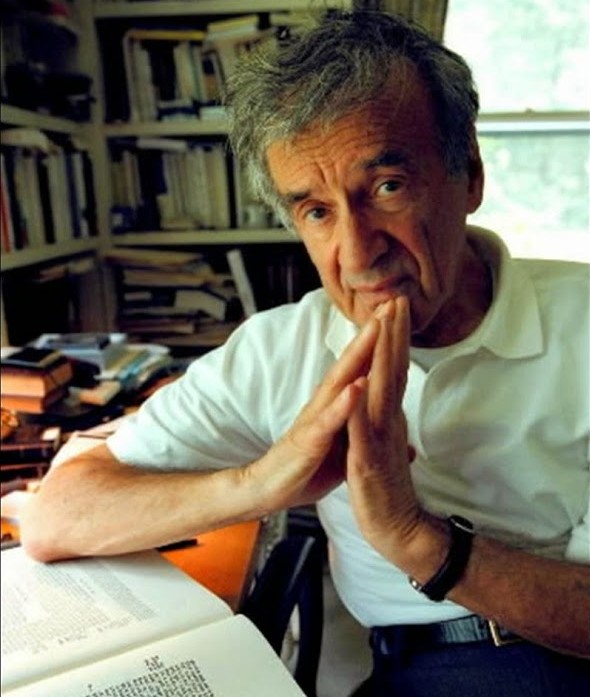
Image uploaded by Loupi Smith to convince people that Elie Wiesel has a tattoo on his left arm. But why is the picture cropped on the right?
I received a letter from “Heidi” and I was a little uncertain whether it was real or not. I have now decided that, unfortunately, it’s for real. But oh my, then we have another instance of a racial brethren who has fallen under the spell of the Elie Wiesel “Con.” Wiesel has an industry behind him that assures massive support for “his story” … or his version of history.
In all her good-hearted but overdone and misdirected sympathy for the sufferers of the world, Heidi becomes nothing more than a brainwashed tool, who is fooling no one but herself.
I wrote back calling her a “brainwashed Canadian,” which she took as an insult, mainly because to her way of thinking it separated us as Canadian and American – different – when in reality we have common ancestors. She may think that is bad, but it’s really much worse. Here is her letter to me; my commentary follows. And I would like to hear comments from the readers too. What do you think?
3 November 2015
Hi Carolyn,
I’m reading Wiesel’s book, Night, for the 2nd time, in French. I have never read it in English, as there were no English copies available at my library. I strongly encourage you to interview Wiesel about the questions you have. I believe he would be more than willing to be interviewed—I just can’t see him turning it down, unless if you were to attack or accuse him, I suppose…that would make anyone feel uncomfortable, you know? After all, he is human, and so are you, so I just don’t see how it couldn’t work. I would be curious to know what he had meant by the “silent/mute blue” he saw in the fire. To be honest, I was quite refreshed by his book that it’s the first time Nazis/SS are differentiated from the German people (I’ve read the comic book, Maus, by Art S, which never attacks Germans either) I think it would be important to ask him why he doesn’t hate Germans. I’m sure he’d be able to explain that question—I have my guesses, but I don’t know the real reason. I have a feeling he’d show you his left arm, if you were to ask him; I looked it up—apparently, it’s there—just faded: (now, you maybe won’t like me! :P )
https://plus.google.com/u/0/111151465916941421669/posts/ihdownSArMG?pid=…
I think that a major issue is that the world didn’t know just how bad things were in Germany after WW1. Things just got worse and worse. The poverty was very bad and traumatizing—a lot of men were killed as soldiers, often leaving behind poor widows with a ton of kids to feed. Certain German children did a lot of child labour, picking potatoes in their bare feet, just to eat. Unfortunately, there was no social aide, so anxiety and fear became a way of life for a lot of people. Of course, I wasn’t there, but I would never have wanted to be, as things just got worse and worse. Nonetheless, not all German kids were poverty-stricken if they were lucky enough to have been born into wealth. The problem was to actually find a job, with the economy being so bad. Good jobs simply couldn’t be found…
I think it’s worth a try to contact Wiesel.
Sincerely,
Heidi (last name withheld, but it’s German)
First, Elie Wiesel is 87. He hasn’t made a public appearance for a couple of years. Is our Heidi aware of that? Probably not.
Even when much younger, Wiesel only allowed interviews when very strict ground rules about what can be asked, and what not, were laid down in advance. It is rare, if not never, that he allows any interviewer, Jew or not, to ask him any non-softball questions. Is Heidi aware of that ? Probably not.
On this website, I have already attacked and accused Wiesel of many things, mainly pointing out the many lies he has told. He has made no attempt to answer any of it. Has Heidi read most of what is on this website? Surely not. She has read the sidebar with the Wiesel Quotes, and the title. She wants Wiesel to explain what he meant by the “silent, blue sky” at night – she’s sure he can. But Heidi, Wiesel didn’t write that he saw the blue sky in the fire, as you say, but that the fire was burning under the silent blue sky … at night. Please keep things straight — one thing I can’t tolerate is sloppiness when talking about Wiesel.
Heidi compares the Jewish book “Night” to the Jewish comic book, “Maus,” by Art Spiegelman, and admires them both because they “differentiate the SS/Nazis from the German people,” she thinks. But they don’t. Elie Wiesel has famously written, “”Every Jew, somewhere in his being, should set apart a zone of hate — healthy, virile hate — for what the German personifies and for what persists in the German. To do otherwise would be a betrayal of the dead.” He also thinks it is perfectly proper and even necessary for ordinary Germans, 70 years after the war ended, to continue to supply “survivors” and Israel with billions more euros … money these innocent Germans are taxed for. But Heidi doesn’t stop to think things through. If she would read more of Wiesel’s writings than just “Night,” she would learn far more about the real nature of the man. If she would read everything on this website, she would really learn about him.
Wiesel has also said that he will never knowingly be in the same room with a holocaust denier! He wants nothing at all to do with them. I am not only all German, but a holocaust denier. So how would he give me an interview?
Heidi makes a distinction between German and Nazi, but I do not. She will say, “Oh, no, not anti-German, but anti-Nazi.” In a second letter that I received from her she told me about her grandmother’s life in Germany right after the war and said of her family, “They weren’t Nazis.” I say, too bad, what were they then?
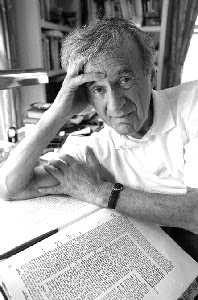
Same setting as feature photo – here we see more of his arm, but when enlarged it is nothing but a shadow.
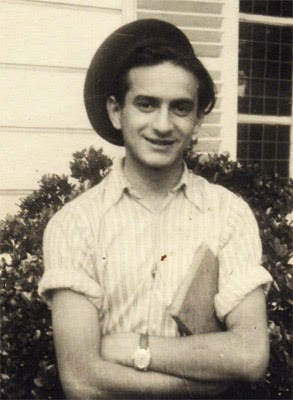
Loupi doesn’t give a source for this photo. Where else can it be seen?
About Wiesel’s left arm, she sends me to the page put up by Loupi Smith, a notorious Jew who probably photoshopped the b/w picture of the young Wiesel (right). If you zoom in on it, nothing that looks anything like numbers shows up. And where was it taken? We have seen plenty of unretouched pictures of Wiesel’s arm where nothing is visible. As to the color photo of the older Wiesel (above) – I have for some time had this small b/w version (above left)* that shows more of his arm, and the darker smudge turns out to be nothing but a shadow. Absolutely – it is not a number. To prove Wiesel has a tattoo, Loupi has to do better than this. And so does Heidi. For instance, a quality magnified view that shows A7713, not just a smudge. Maybe a bit of cooperation from the tattooed person himself would help. Because all the evidence points to the fact that he took another man’s number for his own after the war. The evidence of his handwriting is also conclusive.
[*These two photos also show that a professional photographer was at work — these are not just casual shots of Elie reading in his office! They are staged.]
The world today (at least anyone who has any interest in it) does know how bad things were in Germany after WWI. That information has been widely disseminated. Most people have sympathy for the Germans of that time. But Heidi wants to equate the suffering of the Germans after WWI with the suffering of the Jews during WWII. Jews, however, and Elie Wiesel in particular, will never go along with that! Why doesn’t Heidi have anything to say about the even worse suffering of the Germans after WWII?
Heidi got even more carried away in her second letter:
My grandmother suffered terribly from the poverty in Germany after the 1st war—she was only a year old when her father died as a soldier in 1914, and her mother was left with many children to take of, all on her own, as NO social assistance was available at that time. My Oma had no shoes. She picked potatoes in her bare feet for Jews. You could never possibly understand such suffering, could you? Where were you during that time?
Where was I? Just like Heidi, I wasn’t yet born! How old does she think I am?
I advised Heidi to write to Elie herself and get her own interview — if she thinks it is possible that such a request would even get to him. She answered that she did intend to write to him at his Foundation, a kind of a fan letter, but she didn’t expect to receive a reply. She said:
My only intent would be to express the empathy I feel for all that he suffered. We are all humans, are we not? I believe that he wrote the book while experiencing dreadful pain of those horrible memories, done by war criminals, not the common German citizen of that time. He is very intelligent and well-educated—a special person to me, as he understands human suffering on a very deep level.
Heidi, in her high-mindedness is deeply ignorant. In the photo above right, probably taken in 1946, Wiesel looks mighty healthy and confident. He did not suffer; he made other people suffer. Those who ran the concentration camps were not “war criminals” and were not different from the common German citizens’ like her family, who she pointed out were “not Nazis.” And Wiesel was not well-educated – he was barely educated, except by an odd assortment of rabbis. His doctorate is “honorary.” So she strikes out all the way around. Our Heidi is just another brainwashed German who bows down to kiss the feet of the Jews, thinking that it will be appreciated and everything will be made right thereby. After all, we’re all humans, aren’t we? ~~
12 Comments
Category Featured | Tags: Tags: Auschwitz tattoos, Elie Wiesel, Night,
Social Networks: Facebook, Twitter, Google Bookmarks, del.icio.us, StumbleUpon, Digg, Reddit, Posterous.
Tuesday, May 19th, 2015
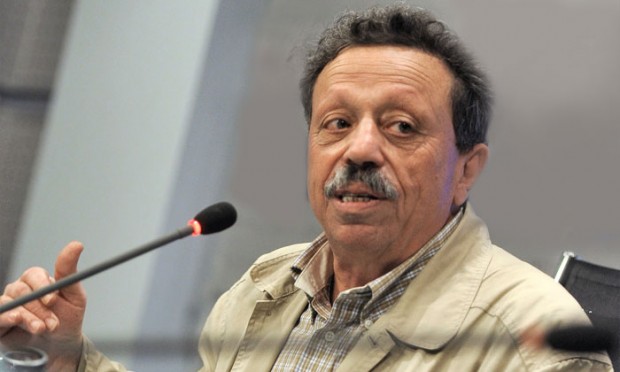
Israel Shamir is a Russian-born Jew who converted to Orthodox Christianity. Norman Finkelstein said of Shamir: “He has invented his entire personal history. Nothing he says about himself is true.”
Warren B. Routledge, author of the new unauthorized biography of Elie Wiesel, Holocaust High Priest, has thankfully CORRECTED some statements made by Israel Shamir in an email to Michael Santomauro referring to my May 11 interview with Routledge. The Shamir comment was posted at Santomauro’s Reporter Notebook Yahoo Group.
Shamir wrote that he knew Wiesel had spent time in Auschwitz because “a good personal friend, a French writer Piotr Ravich (spelling?),” said he did. It doesn’t seem to bother Shamir that this is hearsay, nor that he doesn’t know the spelling of his good, personal friend’s last name! He made some other errors of fact in his email. Here is the full text:
From: <[email protected]> on behalf of Israel Shamir [email protected] [ReportersNotebook]
Sent: Thursday, May 14, 2015 1:00 AM
To: [email protected]
Subject: Re: Listen to The Heretics’ Hour Monday night
There are many funny and dubious points about Wiesel, but he definitely was an inmate in Auschwitz. I had a good personal friend, a French writer Piotr Ravich (spelling?), who won the prix Goncourt. He committed suicide in 1970s, was a wonderful man, quite cheerful. So this Piotr Ravich had spent four years in Auschwitz, as much as anybody, and he knew Wiesel there. They belonged to the elite of the prisoners. Ravich was a translator and interpreter for the administration. Anyway Wiesel was there.
Mauriac played a very important part in Wiesel career, I do not know whether he lusted after him and I do not know whether Wiesel was a gay, but Mauriac’s Catholic faith played a very important part in the story. This is well described in many texts.
I next heard from Warren Routledge informing me that Shamir had made a number of errors in what he had written, and he, Routledge, intended to answer him. Here is Routledge’s response:
This is a follow-up to Israel Shamir’s friendly post in response to Frank Scott’s negative comments about my unauthorized biography of Elie Wiesel, entitled Holocaust High Priest.
I would just like to add a few comments to what Shamir wrote. His statement that his friend, Piotr Rawicz, “knew Wiesel there,” [Auschwitz] and the assurance he gives us that “Wiesel was there” [Auschwitz] are simply not true.
It is possible, however, that Wiesel and Rawicz could have met at some point, however briefly, after the war, when they had each established themselves in the mainstream media as Holocaust camp veterans within just a few years of each other.
Ravicz published his one and only novel Le Sang du ciel, a modernist work in the surrealist vein, in 1961, and received the Rivarol Prize (awarded to a writer born in a linguistic framework other than French) for it in 1962. Shamir also states erroneously that Rawicz received the highly-prestigious Goncourt Prize, which is not the case. Wiesel published La Nuit in 1958 and he also received the Rivarol Prize in 1963 for that work and several other short novels published in the early 1960s.
Each first novel was translated into English, Wiesel’s as Night in 1960, with another one, by his wife in 2006, which is discussed in great detail in my book. Likewise, Rawicz’s novel was translated as Blood from the Sky in 1964, with another, completely separate, translation in 2004.
Shamir states that Rawicz spent “four years at Auschwitz, as much as anybody,” yet Rawicz and his commentators actually only make claims for him being there for two years, from 1942 to 1944, when he was transferred to Terezin.
Rawicz, both in his novel, and in his later life as a literary critic in France, was always very vague, even elusive, about his time spent in Auschwitz. To my knowledge, he never divulged his ID number, date of arrival, block assignment, or other personal information relating to his work duties other than to say he served as a translator while there. In this regard, his friend, the British literary critic and author of the 2004 translation of his novel, Anthony Rudolf, has written of him: “Rawicz was the first to admit that his experience of Auschwitz was not the worst possible.”
What does this mean?
Such reserve is very strange indeed for someone whose career benefited immensely from his aura as a “survivor.” It also stands in opposition, by its prudence, to the outright mendacity and chutzpah of Wiesel who claimed in Night to have seen two massive flaming pits in close proximity to the main gate into which dump trucks were unloading living adults (Pit 1) and living children (Pit 2).
Rawicz’s “silence” about his claimed stay at Auschwitz was such that, before his suicide in 1982, he never described what his life was actually like there. Nor did he ever provide any eye-witness information about the alleged German policy of “extermination” there.
Warren B. Routledge
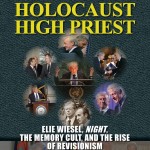
5 Comments
Category Featured | Tags: Tags: Auschwitz, Holocaust High Priest, Israel Shamir, Night, Warren Routledge,
Social Networks: Facebook, Twitter, Google Bookmarks, del.icio.us, StumbleUpon, Digg, Reddit, Posterous.









![Elie Wiesel's left arm in bright sunlight in a still from his own video "Elie Wiesel Goes Home" - no retouching. [courtesy Eric Hunt]](https://www.eliewieseltattoo.com/wp-content/uploads/2012/01/EW_arm-no-tattoo1-e1450887466391.jpg)
















